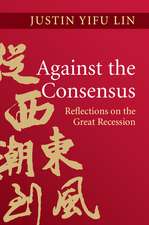New Institutional Economics: A Guidebook
Editat de Éric Brousseau, Jean-Michel Glachanten Limba Engleză Paperback – 3 sep 2008
Preț: 443.33 lei
Preț vechi: 498.13 lei
-11% Nou
Puncte Express: 665
Preț estimativ în valută:
84.87€ • 88.55$ • 71.14£
84.87€ • 88.55$ • 71.14£
Carte tipărită la comandă
Livrare economică 13-27 martie
Preluare comenzi: 021 569.72.76
Specificații
ISBN-13: 9780521700160
ISBN-10: 0521700167
Pagini: 608
Ilustrații: 8 tables
Dimensiuni: 153 x 229 x 30 mm
Greutate: 0.98 kg
Ediția:1
Editura: Cambridge University Press
Colecția Cambridge University Press
Locul publicării:Cambridge, United Kingdom
ISBN-10: 0521700167
Pagini: 608
Ilustrații: 8 tables
Dimensiuni: 153 x 229 x 30 mm
Greutate: 0.98 kg
Ediția:1
Editura: Cambridge University Press
Colecția Cambridge University Press
Locul publicării:Cambridge, United Kingdom
Cuprins
List of figures; List of tables; List of contributors; Acknowledgments; Foreword Oliver E. Williamson; A Road Map for the Guidebook Eric Brousseau and Jean-Michel Glachant; Introductory Chapter - New Institutional Economics: a Report Card Paul L. Joskow; Part I. Foundations: 1. The Theories of the Firm PIERRE GARROUSTE and STEPHANE SAUSSIER; 2. Contracts: From Bilateral Sets of Incentives to the Multi-Level Governance of Relations ERIC BROUSSEAU; 3. Institutions and the Institutional Environment JOHN NYE; 4. Human nature and institutional analysis BENITO ARRUNADA; Part II. Methodology: 5. The 'Case' for Case Studies in the New Institutional Economics LEE J. ALSTON; 6. New Institutional Econometrics: The Case of Research on Contracting and Organization MICHAEL E. SYKUTA; 7. Experimental methodology to inform New Institutional Economics Issues STEPHANE ROBIN and CARINE STAROPOLI; 8. Game Theory and Institutions THIERRY PENARD; Part III. Strategy and Management: 9. New-Institutional Economics, Organization and Strategy JACKSON NICKERSON and LYDA BIGELOW; 10. Inter-firm Alliances: A New Institutional Economics Approach JOANNE E. OXLEY and BRIAN S. SILVERMAN; 11. Governance Structure and Contractual Design in Retail Chains EMMANUEL RAYNAUD; Part IV. Industrial Organization: 12. Make or buy decisions: a NIE approach MANUEL GONZALEZ-Diaz and LUIS VAZQUEZ; 13. Transaction Costs, Property Rights, and the Tools of the New Institutional Economics: Water Rights and Water Markets GARY D. LIBECAP; 14. Contracting and Organization in Food and Agriculture MICHAEL L. COOK, PETER G. KLEIN and CONSTANTINE ILIOPOULOS; Part V. Institutional Design: 15. Buy, lobby or sue: interest group participation in policy making – a selective survey PABLO T. SPILLER and SANNY LIAO; 16. Regulation and Deregulation in network industry JEAN-Michel GLACHANT and YANNICK PEREZ; 17. Constitutional Political Economy – Analyzing the most basic layer of formal institutions STEFAN VOIGT; 18. New Institutional Economics and its Application on Transition and Developing Economies SONJA OPPER; Part VI. Challenges to Institutional Analysis: 19. Law and Economics in Retrospect ANTONIO NICITA and UGO PAGANO; 20. The Theory of the Firm and Its Critics: a Stocktaking and an Assessment NICOLAI J. FOSS and PETER G. KLEIN; 21. The Causes of Institutional Inefficiency: A Development Perspective JEAN- PHILIPPE PLATTEAU; References; Index.
Recenzii
'The New Institutional Economics is an exciting and active research field, and a comprehensive guide to its achievements and future prospects has been long overdue. This book admirably fills this need. Chapters written by experts in various subfields are complemented by excellent commentaries by Oliver Williamson and the editors. New entrants to the field can use it almost as a textbook; practitioners will use it to reinforce their knowledge and as a great reference tool.' Avinash Dixit, John J. F. Sherrerd '52 University Professor of Economics, Princeton University
'This guide offers the reader a tour de force through the ramifications of the new institutional economics. It is a reference not only for those scholars who find their roots in transaction cost theories but for all those addressing institutional analysis.' Giovanni Dosi, Professor of Economics, Sant'Anna School of Advanced Studies, Pisa
'Eric Brousseau and Jean-Michel Glachant's New Institutional Economics: A Guidebook provides a highly readable 'road map' to the varied contributions of the New Institutional Economics. That eclectic stream of research, principally based on transaction costs, property rights, and agency theory, takes an applied perspective to understand how institutions work in the real world. Hence this literature is of immediate interest to strategy and international business scholars. This book, with chapters on organization and strategy, the theory of the firm, transition economies, franchising, make-or-buy decisions, and inter-firm alliances, among others, offers a wealth of fresh and provocative ideas from this emerging literature that are eminently useful to scholars in international business and strategy.' Jean-Francois Hennart, Professor of International Management, Tilburg University
'New Institutional Economics (NIE) has been one of the most successful fields of applied economics, and its contributions have been far-reaching, methodologically and substantively. Methodologically, NIE has developed valuable intersections with other fields in economics, including game-theory, law and economics, public choice and constitutional political economy, industrial organization, managerial economics, and development economics. Substantively, the applications of NIE span through many disciplines, ranging from law to politics, to institutional design, to contracting and business organization. This book is a testament to the growing success of NIE and a valuable guide to its literature for both insiders and outsiders to the field.' Francesco Parisi, Professor of Law, University of Minnesota Law School, and Professor of Public Finance, University of Bologna
'This guide offers the reader a tour de force through the ramifications of the new institutional economics. It is a reference not only for those scholars who find their roots in transaction cost theories but for all those addressing institutional analysis.' Giovanni Dosi, Professor of Economics, Sant'Anna School of Advanced Studies, Pisa
'Eric Brousseau and Jean-Michel Glachant's New Institutional Economics: A Guidebook provides a highly readable 'road map' to the varied contributions of the New Institutional Economics. That eclectic stream of research, principally based on transaction costs, property rights, and agency theory, takes an applied perspective to understand how institutions work in the real world. Hence this literature is of immediate interest to strategy and international business scholars. This book, with chapters on organization and strategy, the theory of the firm, transition economies, franchising, make-or-buy decisions, and inter-firm alliances, among others, offers a wealth of fresh and provocative ideas from this emerging literature that are eminently useful to scholars in international business and strategy.' Jean-Francois Hennart, Professor of International Management, Tilburg University
'New Institutional Economics (NIE) has been one of the most successful fields of applied economics, and its contributions have been far-reaching, methodologically and substantively. Methodologically, NIE has developed valuable intersections with other fields in economics, including game-theory, law and economics, public choice and constitutional political economy, industrial organization, managerial economics, and development economics. Substantively, the applications of NIE span through many disciplines, ranging from law to politics, to institutional design, to contracting and business organization. This book is a testament to the growing success of NIE and a valuable guide to its literature for both insiders and outsiders to the field.' Francesco Parisi, Professor of Law, University of Minnesota Law School, and Professor of Public Finance, University of Bologna
Descriere
A guide to the latest developments in new institutional economics, an exciting and fast-growing branch of economics.











